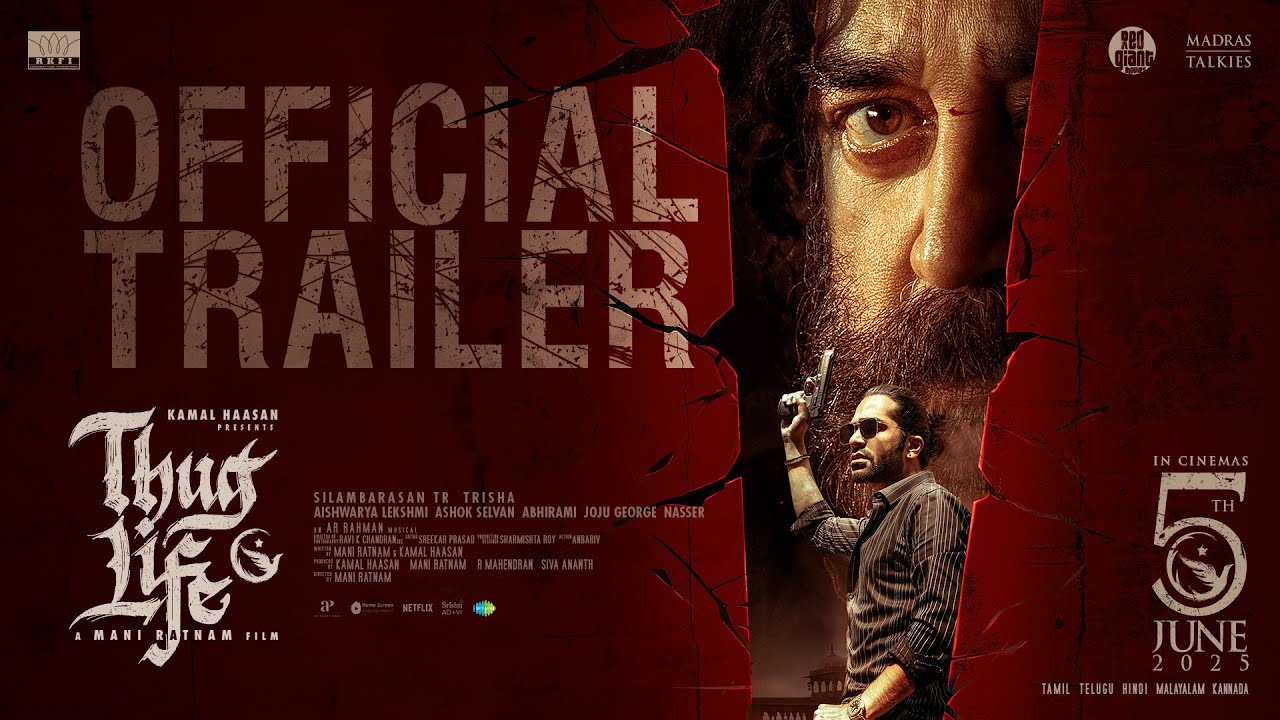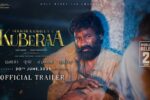Thug Life (2025) Tamil Movie Review – A Deep Dive into Mani Ratnam’s Vision
Introduction
Thug Life brings together two cinematic legends—Mani Ratnam and Kamal Haasan—after nearly four decades. The film explores the dark mafia underworld with layered storytelling and iconic visuals.
This gangster saga is not just about action, but also about betrayal, legacy, and identity, led by a compelling narrative arc.
Storyline and Structure
The plot centers around Rangaraaya Sakthivel (Kamal Haasan), a gangster who adopts Amaran (Silambarasan TR) amidst gang wars. Years later, betrayal sparks a deadly game of suspicion and survival.
Mani Ratnam constructs a tale rich with emotional and psychological depth. Every twist in the story adds to the looming sense of conflict and suspense.
Director’s Vision and Storytelling
Mani Ratnam’s direction shines with nuance and detail. His ability to balance character moments with sweeping visuals defines the film’s mood.
Each frame feels intentional, capturing the internal conflict of the characters as much as their external struggles.
Directorial Choices
Ratnam’s use of timelines, particularly Kamal Haasan’s transformation across eras, is executed with seamless precision. The non-linear structure keeps the tension alive.
The decision to portray the emotional evolution of a gangster and his foster son adds philosophical layers to the otherwise violent setup.
Signature Elements
Fans of Ratnam will spot his recurring themes—family loyalty, tragic choices, and redemption. The film’s color palette and lighting echo Nayakan and Raavanan.
Dialogues are crisp, loaded with subtext. Even silence becomes a powerful storytelling tool in his hands.
Character Development
Kamal Haasan’s Rangaraaya evolves from a feared gangster to a vulnerable father-figure. His emotional transformation anchors the film.
STR’s Amaran morphs from a loyal son into a ruthless challenger, blurring the lines between hero and antagonist.
Performances and Direction
Kamal Haasan delivers a layered performance, showcasing vulnerability beneath a hardened exterior. His expressions carry weight without words.
STR holds his ground with raw intensity. His portrayal of ambition and confusion makes Amaran unforgettable.
Comparative Directorial Style
Compared to Ratnam’s earlier works like Nayakan or Chekka Chivantha Vaanam, Thug Life feels more personal and reflective.
His maturity as a storyteller shows through controlled pacing and emotional complexity, tailored for today’s audiences.
Influences and Inspirations
The Godfather and Sarkar influences are evident, but Ratnam weaves them into a uniquely Tamil cultural context.
He brings a spiritual and philosophical tone to the gangster genre, exploring questions of identity and legacy.
Cinematic Aesthetics
The film’s look is crafted meticulously. Ravi K. Chandran’s cinematography amplifies mood, using shadows and warm tones effectively.
The de-aging effects for Kamal are subtle and impressive, merging technology with art without distraction.
Production and Visual Style
Shot across diverse Indian locations, the visuals reflect a blend of gritty realism and operatic grandeur. Production design captures the mafia world without resorting to clichés.
The stylized violence, mirrored in settings like dim-lit halls and crowded alleys, supports the film’s dark themes.
Critical Reception
Sites like iBomma Movies, Bappamtv Movies, and Iradha Movies have hailed Thug Life as a benchmark in crime drama storytelling.
Critics highlight Ratnam’s firm grip over narrative tone and the balanced use of emotion and spectacle.
Box Office and Popularity
Thug Life opened strong at the box office, pulling audiences across language regions. It has become a talking point among fans and critics alike.
Its theatrical success boosts confidence in auteur-driven mainstream cinema.
Star Cast and Ensemble
Trisha, Joju George, and Nassar add soul to the ensemble. Each character’s arc contributes to the layered narrative.
The casting feels purposeful—every performance enriches the emotional resonance of the plot.
Musical Direction
A.R. Rahman’s soundtrack blends operatic tones with modern soundscapes, giving the film its emotional undercurrent.
Tracks like “Jinguchaa” bring energy, while background scores add suspense and gravitas.
Technical Contributions
Editor A. Sreekar Prasad crafts tight pacing, helping the story unfold with rhythm. No moment feels dragged or rushed.
Visual Effects by H. Monesh maintain realism, especially in action scenes and transformation sequences.
Final Verdict
Thug Life is not just a gangster movie—it’s a layered exploration of identity, loyalty, and legacy. Mani Ratnam delivers a cinematic gem.
The film is a blend of performance, story, and technical brilliance, setting a high benchmark for Indian cinema in 2025.
Star Rating Table
| Category | Rating |
|---|---|
| Direction & Screenplay | 5/5 |
| Performances | 5/5 |
| Music & Soundtrack | 4.5/5 |
| Visuals & Technical Aspects | 4.5/5 |
| Originality | 4/5 |
| Overall | 4.5/5 |
*Star rating is subjective and may vary with viewer preference.
FAQs
What is the central theme of Thug Life?
The film explores loyalty, betrayal, and the shifting dynamics between a foster father and son in a gangster setting.
How does Mani Ratnam’s direction influence the film?
His layered storytelling and emotional focus bring depth to a genre often ruled by violence and power play.
Is Thug Life similar to Nayakan?
While it echoes Nayakan in emotional complexity, Thug Life offers a more modern, introspective take on gangster life.
How is Kamal Haasan’s performance in this film?
Kamal delivers a powerful, nuanced portrayal of Rangaraaya Sakthivel that anchors the film emotionally and dramatically.
What are the standout technical aspects?
Ravi K. Chandran’s cinematography, A. Sreekar Prasad’s editing, and the visual effects team shine throughout.


